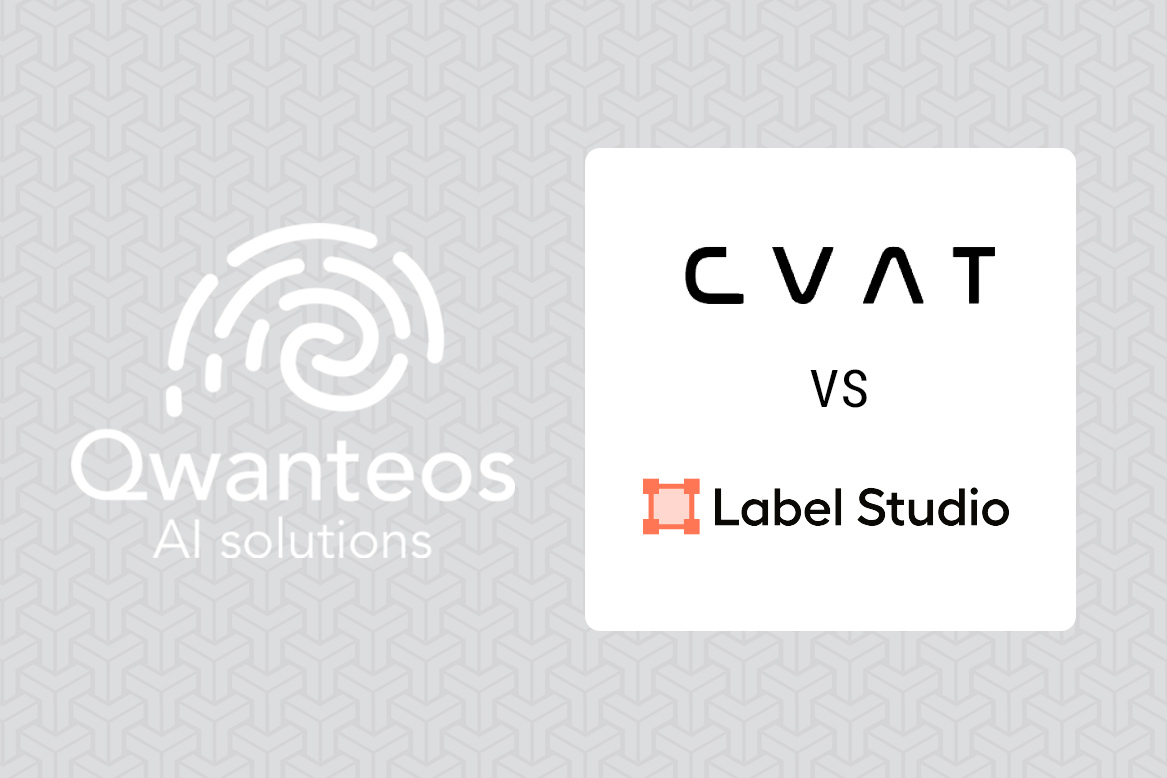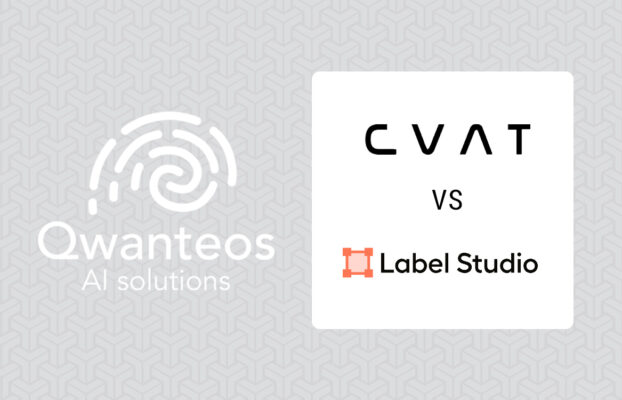Comparing CVAT and Label Studio: Which Annotation Tool Is Right for Your AI Project?
17/06/2025
 In the world of supervised machine learning, high-quality labeled data is everything. Whether you’re training a computer vision model or fine-tuning a multi-modal system, your annotation tools can make or break both the accuracy and scalability of your pipeline.
In the world of supervised machine learning, high-quality labeled data is everything. Whether you’re training a computer vision model or fine-tuning a multi-modal system, your annotation tools can make or break both the accuracy and scalability of your pipeline.
Two of the most popular open-source annotation tools today are CVAT (Computer Vision Annotation Tool) and Label Studio. Both are powerful — but designed with different use cases and philosophies in mind. At Qwanteos, where we manage dozens of annotation workflows for our clients, choosing the right platform can significantly affect performance, cost, and throughput.
In this article, we break down the strengths, weaknesses, and ideal use cases of CVAT and Label Studio.
1. Core Use Cases
| Feature | CVAT | Label Studio |
|---|---|---|
| Primary focus | Computer vision (images, video) | Multi-domain (text, images, audio, time-series) |
| Best for | Bounding boxes, polygons, keypoints, video tracking | NLP tasks, classification, transcription, multi-modal annotation |
| Real-time collaboration | Moderate (task-based) | Strong (project-based with user roles) |
Takeaway: If your dataset is image or video-centric (e.g., object detection, pose estimation), CVAT is optimized for your needs. If you’re handling multi-modal or text-heavy projects, Label Studio is the more flexible choice.
2. UI/UX and Annotation Experience
CVAT offers a highly specialized and mature UI for visual annotation. It supports hotkeys, interpolation between video frames, automatic tracking, and task locking. However, its UI can feel complex for first-time users.
Label Studio features a more modern and intuitive UI, customizable templates, and smooth support for text and audio data. Its flexibility comes at the cost of slightly less precision for advanced vision use cases.
Winner: CVAT for vision experts; Label Studio for mixed teams and broader accessibility.
3. Automation & Integrations
| Feature | CVAT | Label Studio |
|---|---|---|
| Model-assisted labeling | Yes (OpenVINO, TensorFlow) | Yes (via Label Studio ML backend) |
| API & SDK support | REST API, Dockerized | REST API, Python SDK |
| Cloud integrations | Limited | Robust (AWS S3, GCP, Azure Blob, etc.) |
CVAT shines in semi-automated video annotation, while Label Studio excels in integrating with cloud-native ML pipelines.
4. Deployment & Scalability
CVAT is primarily deployed via Docker and often requires more manual configuration to support enterprise use. Its task-based architecture is excellent for dividing large projects but lacks built-in orchestration for workflows.
Label Studio provides both open-source and enterprise editions. It supports scalable deployment via Docker or Kubernetes and includes built-in role management, queues, and audit logs for production environments.
Scalability Verdict: Label Studio offers more out-of-the-box features for distributed teams and enterprise scaling.
5. Community & Ecosystem
CVAT is maintained by Intel and has a strong developer community focused on computer vision.
Label Studio is backed by HumanSignal (formerly Heartex), with fast-growing adoption across industries and regular updates.
Both tools are open-source and active on GitHub, with growing plugin ecosystems. Label Studio’s plugin and ML-backend architecture offers greater extensibility for MLOps workflows.
Final Verdict: Which Should You Choose?
| Choose CVAT if: | Choose Label Studio if: |
|---|---|
| You are working on pure computer vision datasets (images/videos) | You need a multi-domain, flexible annotation platform |
| You require advanced video annotation tools (e.g. object tracking, interpolation) | Your use cases span text, audio, and image data |
| You want precise visual control over frame-level annotations | You prioritize ease of integration with cloud storage and ML services |
| Your team includes skilled annotators in vision-heavy projects | You want a broader team to contribute to diverse data types |
Qwanteos’ Recommendation
At Qwanteos, we frequently deploy CVAT for our high-resolution video and sports datasets, where frame accuracy is critical. For multi-modal projects — such as annotating user feedback, chat logs, and product images — Label Studio enables rapid deployment and easier integration with downstream AI workflows.
Need help setting up and managing your annotation infrastructure? Our teams at Qwanteos provide Workforce-as-a-Service for custom labeling projects, with expert annotators and robust QA processes tailored to your tools and data.
Let me know if you’d like to:
Add a French version of this post
Include screenshots or diagrams
Optimize it for SEO keywords (e.g., “CVAT vs Label Studio”, “data labeling tools”)
Publish a shorter summary version for LinkedIn or newsletter format.
Comparing CVAT and Label Studio: Which Annotation Tool Is Right for Your AI Project?
17/06/2025Choosing the right annotation platform can be the difference between a smooth machine learning pipeline and weeks of delay. In this article, we compare CVAT and Label Studio — two leading open-source tools — across usability, features, automation, and scalability to help you pick the best fit for your AI project.

